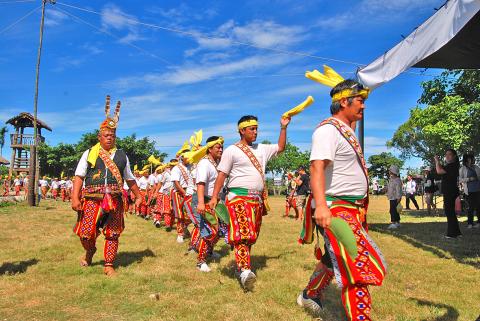The Taitung County Government has been promoting Aboriginal harvest festivals scheduled for this month and next to attract tourists to the region, much to the chagrin of Aboriginal residents, who say the festivals are a time for community gatherings and not a performance for snap-happy tourists.
A total of 148 harvest festivals are scheduled take place these two months, with the Pangcah Fulafulangan community having taken the lead on Sunday and the last one being held on Aug. 23.
The biggest among them are the Makapahay Cultural Festival, organized by the Taitung City Government, the Rukai Taromak’s harvest ritual, the Puyuma’s mulaliyaban (sea festival) and the Katratripulr’s kavarasa’an (millet harvest festival).

Photo: Chen Hsien-yi, Taipei Times
The kavarasa’an, which starts on Tuesday, is a five-day festival that attracts large groups of visitors every year. However, as tourism has become a mainstay in the area, with the support of the local government, many of the traditional festivals have become big tourist attractions in the summer.
Travel agencies have cashed in on the opportunity, but taken local taboos lightly, many Aboriginal communities have complained.
Some tourists walk into sacred places dedicated to ancestral spirits, enter meeting places that are closed to women, and move around or take pictures without permission, they said.
Rukai Taromak Community Development Association secretary-general Pan Wang Wen-pin (潘王文賓) said that Aboriginal communities usually designate a picture-taking zone to avoid visitors intruding on the ceremonies, but many tourists often violate the rules and cause unnecessary trouble.
Kakimi, of the Katratripulr community, said that tourists often ask questions like: “How come you haven’t started dancing?” “Why don’t you sing for us?” and “What are you guys eating, can we have some, too?”
Aborigines can only patiently respond to these questions out of courtesy, Kakimi wrote in a public letter.
What tourists see as “cultural products” are part of the “real life” of Aborigines, who do not want them to be consumed like commodities, she said, adding that each member of the tribes has put their efforts into protecting local traditions.
“When [tourists] visit these tribes, looking forward to singing, dancing, eating Aboriginal food, taking pictures or even trying on traditional clothes, what they overlook is the months or even year-long preparation that go into the holding of these two or three-day ceremonies,” Kakimi said.
She urged visitors to put down their cameras and get acquainted with Aborigines and the practices that go into making these festivities.
“Respect is what most Aborigines expect. Drop the ‘I am the customer waiting to be served’ mentality,” she said.

US President Donald Trump yesterday announced sweeping "reciprocal tariffs" on US trading partners, including a 32 percent tax on goods from Taiwan that is set to take effect on Wednesday. At a Rose Garden event, Trump declared a 10 percent baseline tax on imports from all countries, with the White House saying it would take effect on Saturday. Countries with larger trade surpluses with the US would face higher duties beginning on Wednesday, including Taiwan (32 percent), China (34 percent), Japan (24 percent), South Korea (25 percent), Vietnam (46 percent) and Thailand (36 percent). Canada and Mexico, the two largest US trading

AIR SUPPORT: The Ministry of National Defense thanked the US for the delivery, adding that it was an indicator of the White House’s commitment to the Taiwan Relations Act Deputy Minister of National Defense Po Horng-huei (柏鴻輝) and Representative to the US Alexander Yui on Friday attended a delivery ceremony for the first of Taiwan’s long-awaited 66 F-16C/D Block 70 jets at a Lockheed Martin Corp factory in Greenville, South Carolina. “We are so proud to be the global home of the F-16 and to support Taiwan’s air defense capabilities,” US Representative William Timmons wrote on X, alongside a photograph of Taiwanese and US officials at the event. The F-16C/D Block 70 jets Taiwan ordered have the same capabilities as aircraft that had been upgraded to F-16Vs. The batch of Lockheed Martin

GRIDLOCK: The National Fire Agency’s Special Search and Rescue team is on standby to travel to the countries to help out with the rescue effort A powerful earthquake rocked Myanmar and neighboring Thailand yesterday, killing at least three people in Bangkok and burying dozens when a high-rise building under construction collapsed. Footage shared on social media from Myanmar’s second-largest city showed widespread destruction, raising fears that many were trapped under the rubble or killed. The magnitude 7.7 earthquake, with an epicenter near Mandalay in Myanmar, struck at midday and was followed by a strong magnitude 6.4 aftershock. The extent of death, injury and destruction — especially in Myanmar, which is embroiled in a civil war and where information is tightly controlled at the best of times —

China's military today said it began joint army, navy and rocket force exercises around Taiwan to "serve as a stern warning and powerful deterrent against Taiwanese independence," calling President William Lai (賴清德) a "parasite." The exercises come after Lai called Beijing a "foreign hostile force" last month. More than 10 Chinese military ships approached close to Taiwan's 24 nautical mile (44.4km) contiguous zone this morning and Taiwan sent its own warships to respond, two senior Taiwanese officials said. Taiwan has not yet detected any live fire by the Chinese military so far, one of the officials said. The drills took place after US Secretary